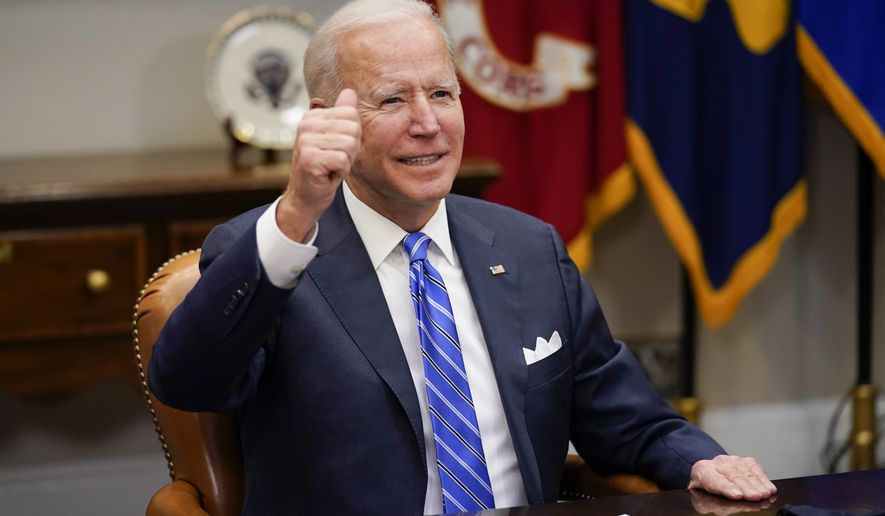Partisan fault lines emerged over Democrats’ Green New Deal on Thursday as President Biden hosted a bipartisan meeting of lawmakers at the White House seeking support for a massive boost in spending to fix the nation’s roads, bridges and other infrastructure.
Democrats’ goal is to spend about $2 trillion on “sustainable” infrastructure, with climate change concerns driving their agenda. But Rep. Sam Graves of Missouri, the top Republican on the House Transportation and Infrastructure Committee, emerged from the Oval Office meeting warning that the Green New Deal is a nonstarter for conservatives.
“Republicans won’t support another Green New Deal disguising itself as a transportation bill,” Mr. Graves said in a statement. “We made clear that in order for infrastructure efforts to be successful, the administration and the [Democratic] majority need to consider Republican priorities. It cannot be a ‘my way or the highway’ approach like last Congress.”
The participants discussed the perennial hurdle of how to pay for an infrastructure plan. Congress has resisted for years any proposal to increase the 18.4 cents-per-gallon federal gasoline tax, which has not changed since 1993.
A source familiar with the meeting said there was a brief discussion about replacing the gas tax with a “vehicle miles traveled” user fee. It would tax drivers based on the number of miles traveled, instead of on fuel consumption.
The VMT fee has been tested in states such as Oregon and Utah. It also has raised privacy concerns about the possibility of the government tracking motorists’ travel.
Transportation Committee Chairman Peter DeFazio, Oregon Democrat, said after the meeting that the group discussed funding options, but he declined to be specific. He said the meeting “went very well.”
“He wants to move as quickly as possible,” Mr. DeFazio said of the president. “He wants it to be very big, and he feels that this is the key to the recovery package. I was encouraged by the discussion.”
Mr. Biden told reporters at the start of the meeting that he wants to focus on “American competitiveness and what we’re going to do to make sure we once again lead the world across the board in infrastructure.”
“It not only creates jobs, but it makes us a hell of a lot more competitive around the world if we have the best infrastructure in the world,” Mr. Biden said.
An infrastructure spending package could gain some Republican support, unlike the $1.9 trillion COVID-19 relief proposal that was approved by the House last week. The Senate took up that package Thursday.
Mr. Graves said Republicans’ biggest concern is that a massive infrastructure bill would imitate the current COVID-19 relief package by including hundreds of billions of dollars in unrelated spending.
“First and foremost, a highway bill cannot grow into a multitrillion dollar catch-all bill, or it will lose Republican support,” Mr. Graves said. “We have to be responsible, and a bill whose cost is not offset will lose Republican support. A transportation bill needs to be a transportation bill that primarily focuses on fundamental transportation needs, such as roads and bridges.”
He also said “equity for rural America” is a top GOP priority.
“Rural infrastructure needs cannot be left behind, and we cannot continue to allow a growing disparity between resources provided to urban and rural communities, as we saw in the $30 billion transit funding portion of the majority’s recent COVID-19 package,” Mr. Graves said. “We all have the same goal of improving America’s transportation infrastructure, but we cannot overlook broad sections of the country in the process.”
Among the other lawmakers who attended the White House meeting were Rep. Rodney Davis, Illinois Republican, and Delegate Eleanor Holmes Norton, D.C. Democrat.
Mr. DeFazio said the meeting was a“refreshing” change from dealing with former President Donald Trump.
“Having sat with Donald Trump to discuss infrastructure, and the difference between talking to Joe Biden about infrastructure and what goes into it and how we’re going to get it done, and Donald Trump is like, it’s just a whole different world,” he told reporters. “It’s way better.”
Mr. Trump intermittently pushed for an infrastructure plan but never got it off the ground. His relationship with congressional Democrats quickly soured over investigations of his administration and, ultimately, two impeachments.
• Dave Boyer can be reached at dboyer@washingtontimes.com.




Please read our comment policy before commenting.